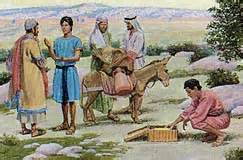I mentioned in an earlier post that the Book of Mormon is not a broad history but a very ethnocentric history of one man's family and their descendants. This is comparable to the Bible being the history of Abraham's family, specifically, the descendants of his grandson Jacob/Israel. Other nations are mentioned in the Bible only as they relate to the Israelites. This is the case from the Book of Genesis forward. Even the New Testament is in some ways a lineage history, as evidenced by Matthew's detailed genealogy of Jesus Christ in the first chapter of his gospel.
Lineage group histories are the norm among Near Eastern peoples. Today I'm going to talk about how that translates culturally to the people of the Book of Mormon.
What the Book of Mormon Says:
Now the people which were not Lamanites were Nephites; nevertheless, they were called Nephites, Jacobites, Josephites, Zoramites (Jacob 1: 13) [See picture to the left of Nephi speaking to Zoram with Sam sitting on the ground.] Those who were numbered among the Lamanites were called: Lamanites, Lemuelites, and Ishmaelites. (Jacob 1: 13)
I've never before noticed that Jacob is very particular in his writing the lineage groups of his people. (Remember that Sam is always numbered in Nephi's lineage group and that Jacob and Joseph were Lehi's two youngest sons born during the wilderness trek through Arabia.) Recently, while re-reading Sorensen's book, I noticed for the first time the importance of lineage groups among the Hebrews. Remember that when the Children of Israel first settled in their promised land, each tribe or lineage group was given an inheritance of land. Could that have happened in America?
What Scholars Say:
In the late 1960s, a group of archaeologists/anthropologists from Pennsylvania State University studied the ruins of Kaminaljuyu (possible site of the City of Nephi), dating from 600 BC through 300 BC (the Nephites would have been there from about 544 BC to 275 BC.) The findings of these researchers was that the city was occupied by several kin groups or lineages, each living in a certain sector of the site. [1]
The Nephites occupied the City of Nephi for over 300 years. During that time, following the deaths of Nephi and Jacob, the people became more lax in their dealing with God. The entire history of that time period is covered by the writings of seven men of Jacob's lineage. We will hear from those men tomorrow on the Couch.
[1] Sorensen, p.145
Text copyright July 2013 Gebara Education
Pictures from www.lds.org


No comments:
Post a Comment